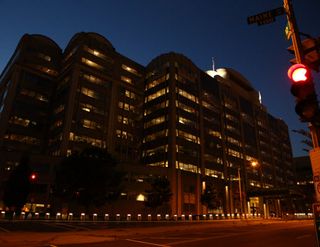FCC Votes to Reverse Charter-TWC Overbuild Requirement

The FCC has voted to modify the Charter-Time Warner Cable deal conditions by removing the requirement that Charter overbuild a million internet access customers who could already get high-speed access from another provider, an FCC spokesman confirmed.
The idea of the condition, imposed under former FCC chairman Tom Wheeler, was to promote price and speed competition.
New FCC chairman Ajit Pai circulated the item last month, after which it was widely expected to be approved, the only real question being how. Republicans hold the majority and both Pai and commissioner Michael O'Rielly opposed the condition.
According to multiple sources, Democrat Mignon Clyburn concurred in the decision, which is short of support, but allows the item to be adopted without forcing the chairman to place the vote on a public meeting agenda. (UPDATE: Clyburn's office confirmed the concurrence [see below]).
While a fully staffed commission--five commissioners--can adopt an item on circulation--outside a public meeting--even if the other commissioners won't vote it, when the commission is down two three, an item can't be adopted on circulation even with two of the three votes in favor.
The buildout requirement remains, but according to the item that could now all be buildouts to currently unserved homes, with no overbuilding (where there is already at least 25 MHz service offered) required, though Charter could still choose to overbuild those one million. They are just no longer required to do so. Charter last year said it intended to focus its overbuild activity against telco broadband providers, not other cable companies.
The FCC was viewing it as an expansion of the buildout to unserved to two million from one million unserved and one million overbuild.
What was being circulated was the grant of a petition for reconsideration of the deal condition by the American Cable Association, which had asked that the overbuild requirement be removed.
ACA has seven million subs that could theoretically be targets for overbuilds.
Multichannel Newsletter
The smarter way to stay on top of the multichannel video marketplace. Sign up below.
Last May, when the Charter-Time Warner Cable order was released, then-commissioner Pai blasted the overbuild condition and the buildout condition as well. "Charter’s increased broadband market share will come at the expense of smaller competitors," he said, adding that the order moved the FCC "one more step down the path of micromanaging where, when, and how ISPs deploy infrastructure."
Pai actually dissented from the order but not because he thought the deal was not in the public interest, but because he thought the conditions the FCC majority extracted from the companies in an effort to micromanage the wider internet economy were not.
"By modifying the overbuilding condition, the FCC enables Charter to more fully devote our resources and attention to building out high-speed broadband to areas without it today," Charter said in a statement.
"ACA is very pleased the FCC eliminated the requirement for Charter to offer broadband service to 1 million homes that are already receiving broadband service from another provider," said ACA President Matt Polka. "In all likelihood, these overbuilds would have occurred where smaller operators are serving areas that might not support two providers. "The FCC's decision is compelling because the agency is simultaneously advancing the goal of affordable and universal broadband by requiring Charter to venture into unserved areas and by eliminating the threat of government-mandated uneconomic entry into smaller operators' markets," POlka said.
"First and foremost, my goal has and always will be to bring fast, affordable broadband to all Americans," said Clyburn in a statement. "In that vein, less than one year ago, as part of the Commission’s approval of the Charter, Time Warner Cable, and Bright House Networks merger, I stated that I wished the Commission would have gone further, by requiring New Charter to build-out broadband to more locations. Regrettably, that ship has sailed. But by preserving New Charter’s condition to bring broadband to two million new locations, this Order addresses another one of my concerns: namely, that among those locations, we allow New Charter to serve more unserved homes."
Contributing editor John Eggerton has been an editor and/or writer on media regulation, legislation and policy for over four decades, including covering the FCC, FTC, Congress, the major media trade associations, and the federal courts. In addition to Multichannel News and Broadcasting + Cable, his work has appeared in Radio World, TV Technology, TV Fax, This Week in Consumer Electronics, Variety and the Encyclopedia Britannica.

